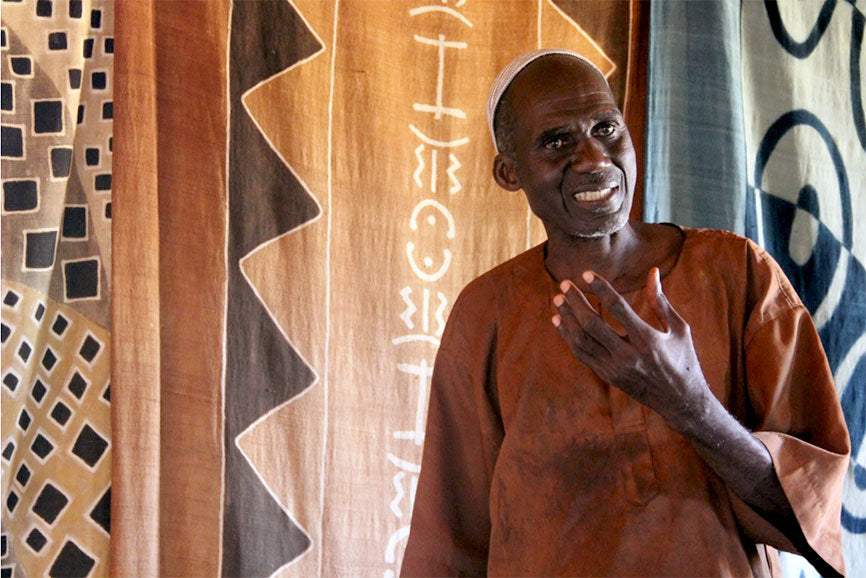The Quest for Knowledge

Ndomo builds modern social entrepreneurship
upon the foundation of an African paradigm.
In Mali, a landlocked country in West Africa, more than half of the population is under 18 years of age. Yet the future prospects for most adolescents and young adults are dire, as they are constantly held back by the inaccessibility of the formal education system, high drop-out rates, weak job market, and almost non-existent social welfare in the country. To help the next generation become self-reliant entrepreneurs, textile designer Boubacar Doumbia started a natural dyeing workshop, where apprentices form a community to learn professional, financial, and social skills.Doumbia named his workshop Ndomo - in the Bambara language, it means “the quest for knowledge”.
THE CHALLENGE
Doumbia founded Ndomo in 1990, when he was a textile designer from the National Institute of Arts in Mali's capital city, Bamako. “We were in the early 90s, at that time, Mali was facing a serious problem of unemployment, which led to a massive exodus of young people to Europe. I wondered how to solve this unemployment problem, and for me, the answer lies in a return to tradition”, he says in an interview with Nothing but the Wax.
Doumbia resorted to the ancient Malian initiatory system, in which “Ndomo” is the first step: young people enter a shared collective with the quest for knowledge; elders group them by age, and introduce them to training that help them gradually integrate into professional life. The wealth created in their collective work is distributed equally among all participants, while all members are encouraged to pioneer their personal projects, of which they take full responsibility to earn profits for themselves. It is in essence a school of life that teaches the youth to become responsible and independent.
“With colonization, the Ndomo disappeared”, saysDoumbia. “In the Western capitalist system, the employer earns more than the employee. However, with us, there has existed for centuries a system that is completely egalitarian. The problem is that colonization made us use practices that were not ours… My idea was therefore to connect our traditional initiatory system to the business world. This is how the Ndomo workshop was born.”
A LOCAL PRIDE
The first group of apprentices trained in Doumbia’s native town of Ségou, where he had a small workshop equipped with simple tools. Some members had never received formal education, while others had physical or learning disabilities.Doumbia tried different ways to encourage them to become both artists and entrepreneurs, using one traditional medium unique to the region: the mud cloth.
Mud cloth, also known by the locals as bogolan, is created with a vegetable dyeing technique dating back to the 10th-11th century. Legend has it that a hunter dressed in a yellow ochre outfit killed an animal, found his game in a swampy area, and threw it over his shoulder. The wet mud stained his clothes. When he got home, his wife washed his clothes to remove the mud, but an indelible black stain remained on the fabric. She then learned to soak a fabric and draw on it with the mud, and this fabric took the name of bogolanfini (“the result of mud on fabric” in Bambara). Since then, the bogolan technique has belonged exclusively to Malian women, who invented symbols over the years as a means of expression to compose essays.
Building on traditional dyeing techniques, Ndomo re-contextualized bogolan in the modern era. Their bogolan are usually created with much wider fabrics than the bogolan strips of the old times, when the width of fabric was confined by narrow handheld looms and rarely exceeded 7 inches. With the modern handlooms at the workshop, artisans weave their own fabrics using locally grown cotton. Their designs are deeply informed by traditional African art, yet radiate the boldness and limpidity that only belong to the young minds. As their works gradually gained international acclaim in Japan, Europe, and the United States, Ndomo has been recognized as an expert center of the bogolan techniques. From the Ségou region to the entire country of Mali, the workshop and its programs are regarded as not only an example of social and economic success, but also an object of local pride.
THE ULTIMATE GOAL
In Mali’s traditional initiatory system, there are three types of work: collective work, support work, and personal work. At Ndomo, mornings are devoted to collective work, where everyone works together on major orders. In the afternoon, members are free to work for themselves. To complete the support work, one can either work overtime, or put 10% of their personal income into the working capital of the workshop.
Rather than simply training apprentices in textile production, Doumbia has overhauled the old system by placing young people in an entrepreneurial role from the outset. He has designed the two-year apprenticeship to fuse textile production with broader business skills, such as financial management and savings strategies. Upon finishing the apprenticeship, graduates are ready to venture on their own with enough money saved for start-up capital.
It’s Ndomo’s goal to support and empower young artisans, enabling them to become successful entrepreneurs. Knowledge of production and management techniques, coupled with trade skills and a sense of independence, encourages entrepreneurship that creates new jobs and industries within local communities. Over the past two decades, Ndomo alumni have formed a network of aspiring crafts people, who share a sense of solidarity and mutual support that strengthens the trade.
The philosophy of Ndomo and Doumbia’s management methodology of social enterprise resonates with communities throughout Mali - it appeals to their entrepreneurial drive, and more fundamentally, their culture of shared values and responsibility. Ndomo members have traveled to different places to set up apprenticeship programs for a variety of groups: string makers, metalsmiths, farmers that grow traditional plants used for textile dyes, and representatives from national crafts organizations.
Ndomo is the work where Boubacar Doumbia committed his lifetime. It advocates a return to tradition, demonstrates the success of social entrepreneurship anchored in an African paradigm, and ultimately, calls on a new generation to think and manufacture differently.

Words: MINZUU Photos: NDOMO




